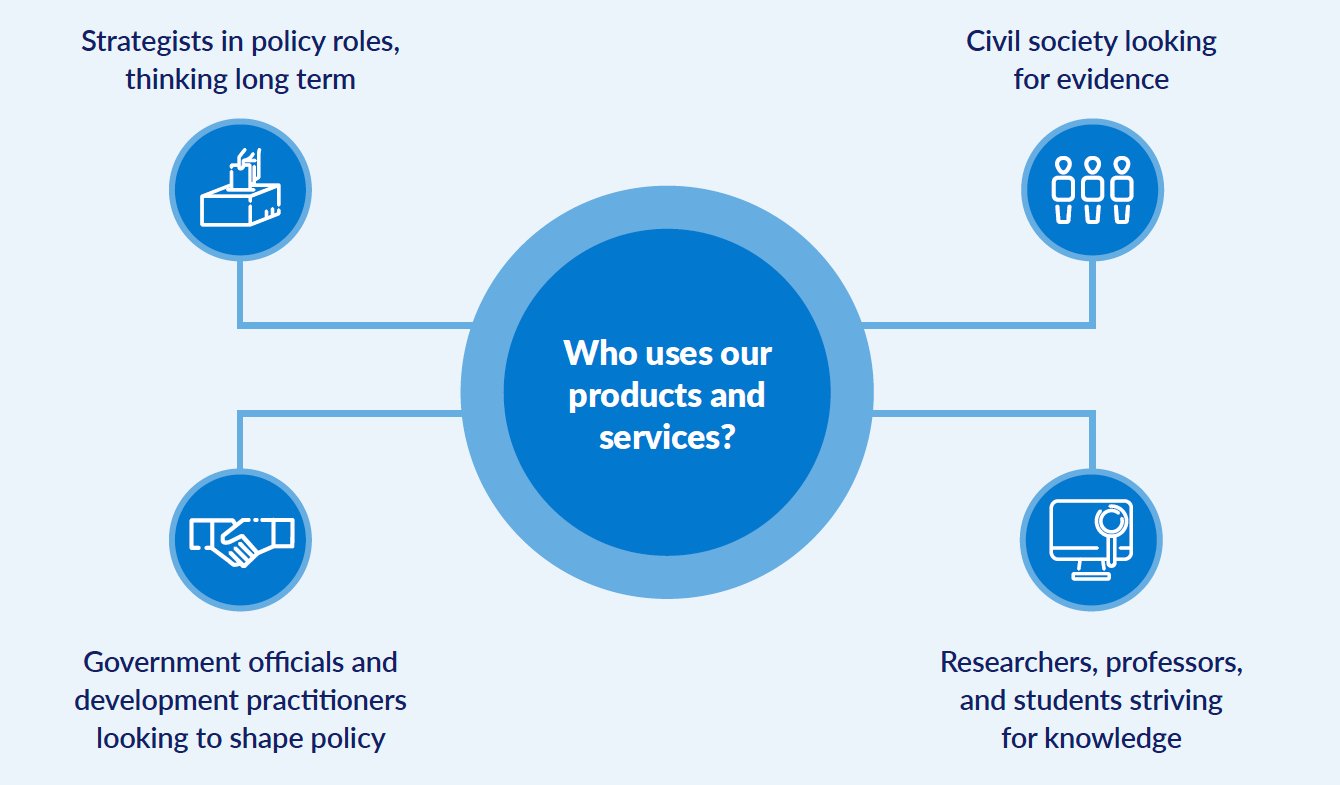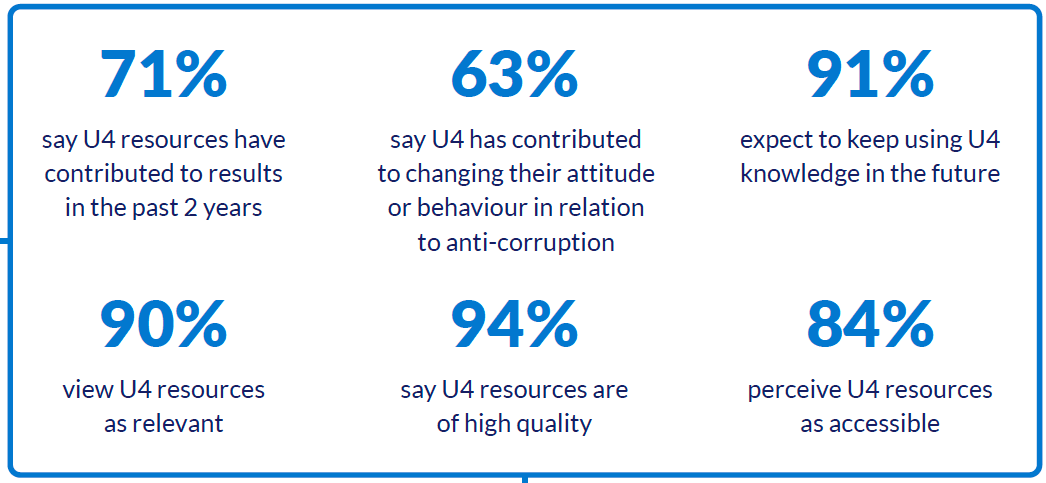THE U4 PARTNERSHIP
Download PDF-flyer English | French
Increase anti-corruption insights > improve donor performance
Anti-corruption efforts support your work towards sustainable and inclusive development
Achieving peaceful and inclusive societies, in which sustainable development can take place, requires progress on anti-corruption. Anti-corruption is central to the governance challenges that many bilateral development agencies address.
The donor community recognises that they must continue to take active steps to curb corruption in support of Sustainable Development Goal 16: Access to justice for all and effective, accountable, and inclusive institutions.
The U4 Anti-Corruption Resource Centre
Delivering expertise for better donor performance
The U4 partnership
Nurturing donor relations and networks
The U4 Anti-Corruption Resource Centre (U4) exists through donors collaborating to end corruption. Bilateral development agencies and foreign affairs ministries have been at the heart of this successful institutional partnership since 2002.
U4’s collaborative, basket-funded model produces maximal value for development funding and encourages collaboration between development practitioners from the headquarter level to country offices.
U4’s partners are like-minded agencies whose goal is to make lives better. U4’s task is to help partners achieve results through effective anti-corruption efforts.

The corruption landscape in 2024
Factors that influence donor anti-corruption efforts
We see four key challenges that affect donor anti-corruption efforts:
- Local conditions and challenges affect how donors and other actors work to reduce corruption in aid-receiving countries.
- On the global scene, there are shifting geopolitical power centres. Some promote agendas that undermine multilateral efforts.
- Corruption is a complex problem with transnational dimensions.
- Organisations supplying development aid often work with uncertain budgets and shifting priorities. As a result, anti-corruption efforts risk being deprioritised.
We support our partners to address all four issues to curb corruption.
U4 partner benefits
Building blocks for better development outcomes
U4’s team of specialists works to ensure that your agency can:
- Support anti-corruption research as a public good through publications and webinars.
- Take online courses and invite local collaborators along.
- Ask questions to our anti-corruption helpdesk.
- Apply for and attend in-country workshops and invite local partners.
- Host expert-led headquarter seminars for staff.
- Set U4 priorities through the steering committee.
- Collaborate with like-minded bilateral development agencies in partner forums.
Global awareness on how to curb corruption
U4 knowledge is a donor-funded public good
With our partners, we are committed to making our research and activities freely and widely available, so they have the greatest possible impact.
Our acclaimed, high-quality research and resources are used by practitioners, activists, governments, and academics. These include mulitlateral organisations such as the World Bank, IMF, WHO, UNODC, and the OECD.
Our work is global and multidisciplinary:
- U4 reaches beyond the governance and
- anti-corruption community.
- Two thirds of our website users are in Africa, Asia,
- and Latin America.
- We offer resources in several languages.

Anti-corruption insights for practitioners
U4’s thematic expertise
Our anti-corruption advisers specialise in understanding corruption challenges from a donor and development perspective.
On our website you can get basic information and in-depth resources on corruption challenges and anti-corruption approaches linked to the following topics:
|
Corruption |
Environment and climate |
|
Public financial management |
|
|
Civil society |
|
|
Public service delivery |
|
|
Development cooperation |
|
|
Justice sector |
|
|
Ukraine reconstruction |
|
|
|
Evidence-based knowledge
U4 publications with practical recommendations
Practitioners and others can access in-depth analyses around emerging topics and new research findings that can help them achieve results in their own work.
We present complex issues in short and accessible formats through around 30 new publications annually, and several blog posts every month.
Build your anti-corruption skills
U4 online courses, created by experts
Practitioners who complete U4 online courses are better equipped to promote, design, and succeed with anti-corruption efforts in all projects and programmes.
All U4 partner agencies’ staff can take our dynamic and time-efficient online courses for free. They can also nominate external participants for a free place, for example staff from collaborating NGOs, and multilateral or government agencies.
Self-paced courses: Short, introductory courses of about an hour (open to anyone).
Expert-facilitated courses: Lasting 2–4 weeks depending on the topic, with dedicated experts as facilitators.
The U4 training portfolio is continuously being revised and developed.
Topics in the U4 training portfolio
- Essentials of anti-corruption I: the basics (English, French, Spanish, Arabic, Ukrainian)
- Essentials of anti-corruption II: Development programming
- Corruption risk management
- Gender
- Health sector
- Justice sector
- Natural resources sector (English, French)
- Fragile and conflict-affected states
Anti-corruption encounters
Country engagements and webinars
Corruption is a sensitive topic. Agents of change are able to find each other when they have a neutral forum in which to discuss it openly. U4 partners and embassy staff get together at the country level to host U4-facilitated dialogues in jointly planned workshops. Government officials from the country, representatives from multilateral institutions, NGOs, and academics take part in the events.
During the past decade, we have held over 80 such workshops for U4 partner agencies and their local partners. We cover topics such as collective donor responses, national anti-corruption strategies, and civil society engagement, as well as sector challenges such as justice, health, education, natural resources, climate, and more.
We frequently hold short, thematic webinars that bring practitioners and others up-to-speed on important challenges for anti-corruption and development cooperation.
Ask the U4 Helpdesk
Tailored anti-corruption answers
All U4 partner agency staff can send corruption-related questions to the U4 helpdesk.
We operate the helpdesk in collaboration with a team of researchers based at the Transparency International Secretariat in Berlin, Germany.
The helpdesk staff consult an international network of anti-corruption experts and practitioners to develop answers within 10 working days.
We handle over 30 questions every year. You can find almost 500 previous helpdesk answers on our website.
Changing anti-corruption behaviour
Delivering results for U4 partners and beyond
We continually monitor and evaluate our work. User feedback helps us respond to evolving needs and improve what we offer. Annual user surveys show high satisfaction in many areas:

How to join the U4 partnership
Funding and organisation
The U4 partnership welcomes government ministries or agencies responsible for development funding and programmes to join.
Becoming a U4 partner agency means that you will have representatives on our steering committee. The committee meets annually to discuss priorities and approve work plans and reports. Before you join, you are welcome to observe the steering committee meeting as a guest.
U4 partner agencies normally commit to fund a five-year strategic period through a basket-funding model.
The steering committee decides on the annual funding level that partners should contribute. This is based on the total costs of planned U4 activities. The rate for each partner is 266,400 Euro per year.
Please do not hesitate to get in touch if you would like further information: u4@cmi.no
Budget and work plan
U4 follows five-year strategies and annual work plans with a yearly budget at 3 million Euro in 2024.
Example of annual deliverables
- 30+ research publications
- 7 online courses / 14 classes
- 1,600 course participants
- 10 country engagements
- 10+ partner forums and webinars
- 30+ Helpdesk answers
- 25 blog posts
Chr. Michelsen institute
The U4 Anti-Corruption Resource Centre’s institutional home is the Chr. Michelsen Institute (CMI) in Bergen, Norway. Established in 1930, CMI is today a private, non-profit, independent research institute on global development and human rights, and is regarded as a leading voice on these issues.
CMI set up U4 in 2002 to assist donors in understanding corruption and finding solutions.
Our team of researchers, advisers, administrators, managers, and communicators collaborates with a global network of experts and practitioners to deliver operationally relevant resources for U4 partners.